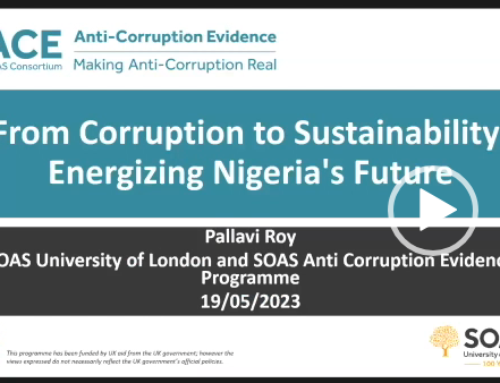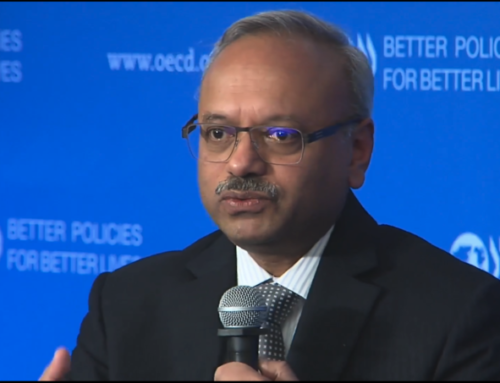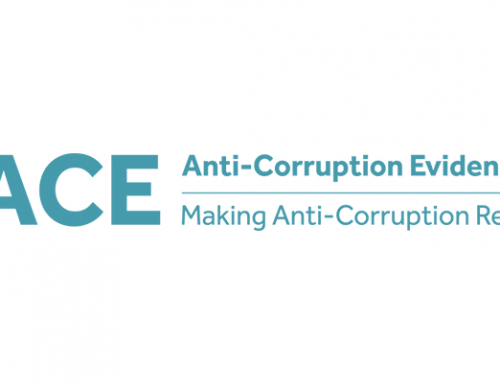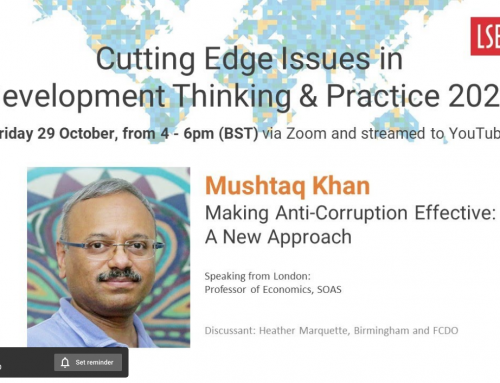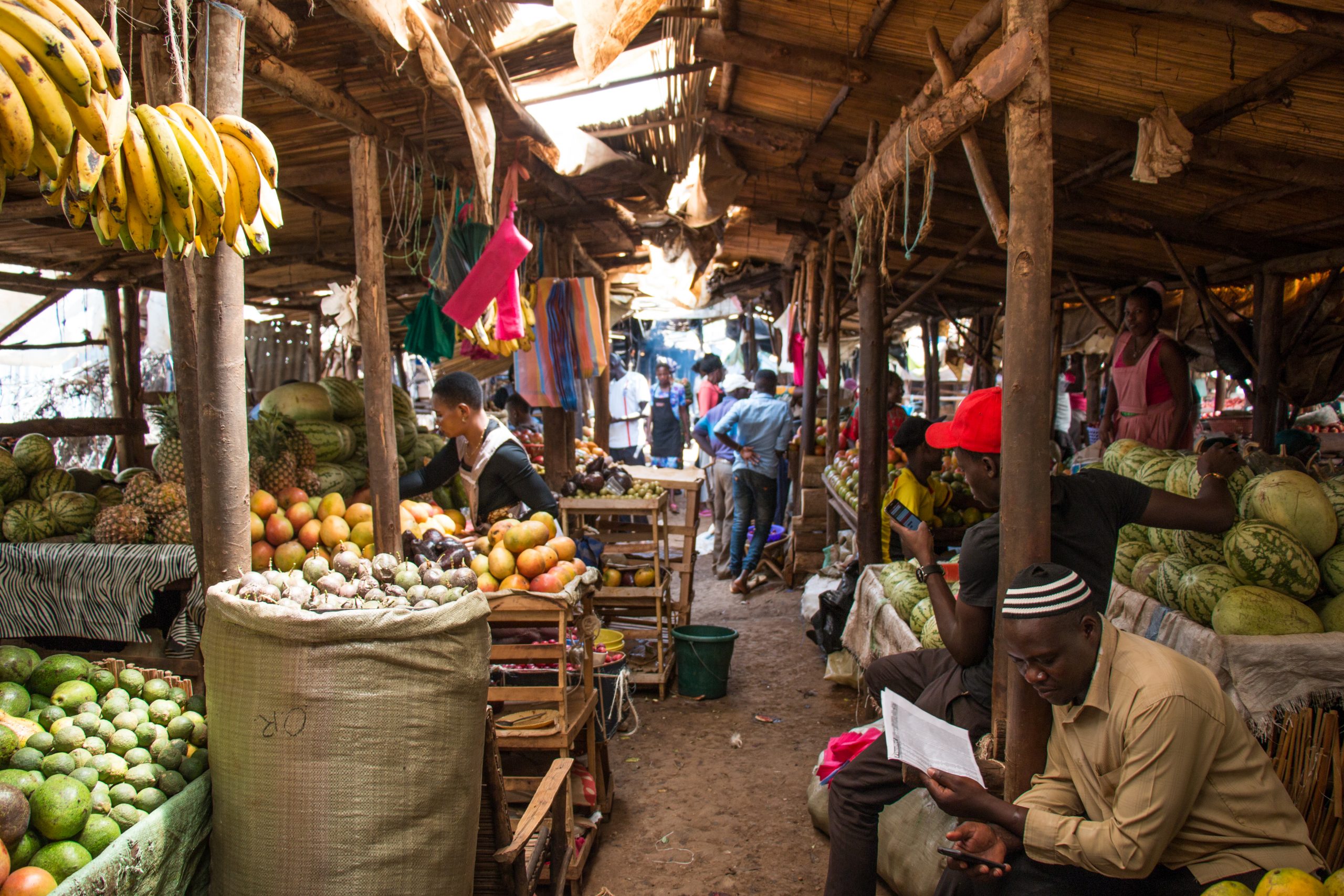 Joint blog post between GI-ACE and SOAS-ACE
Joint blog post between GI-ACE and SOAS-ACE
The Anti-Corruption Evidence (ACE) programme, funded with UK aid from the UK government in a £15 million investment from 2015–2021, is designed to produce new, relevant research evidence on tackling corruption. Despite decades of global anti-corruption initiatives, the track record of such efforts has been disappointing. It is now widely accepted that technocratic, ‘one-size-fits-all’ approaches have failed to deliver, and that to address corruption effectively, practitioners must be able to understand a complex set of dynamics, drivers, and processes to develop better interventions. ACE aims to use research findings to develop more evidence-based and targeted solutions.
ACE is an interdisciplinary program, encompassing political science, economics, business, anthropology, sociology, law, public health, and urban studies. ACE’s research questions require a combination of methodologies and substantial fieldwork to generate new data, as well as a range of experimental methods. (All datasets – quantitative and qualitative – will be made available publicly.)
The program’s key features include:
- Investigating anti-corruption (not just corruption itself)
- Focusing on real-world problems (not just on concepts or theory)
- Devising solutions that can be implemented (not just be ambitious on paper)
- Tackling the politics of anti-corruption (as well as the technical barriers)
- Demonstrating impact (by measuring reduced corruption)
There are two strands of the ACE programme: GI-ACE and SOAS-ACE. The Global Integrity Anti-Corruption Evidence (GI-ACE programme consists of 14 global research partners who are conducting practical research in three priority areas: the international architecture that enables illicit financial flows; integrity systems that ensure stakeholders proactively engage in ethical behaviour; and corruption initiatives at both sub-national and sectoral levels. The overarching goal of GI-ACE is to generate actionable evidence for use in designing and implementing more effective anti-corruption initiatives.
The SOAS-ACE research consortium, led by SOAS University of London, comprises of 12 global partners and 9 grantee institutions; including both private and public sector organisations. The consortium focuses on how policy resources (or rents) are allocated in specific sectors and how the unproductive capture of these rents affects development outcomes. SOAS-ACE then uses a political settlement analysis to map the relative power of actors or players in the sector. The aim is to identify opportunities within sectors where feasible policies can persuade a coalition of players to support the enforcement of rules that allow them to pursue their own productivity.
Complementary Theories of Change
GI-ACE’s Theory of Change recognises the critically important role researchers play in producing rigorous evidence that can help to make progress. The GI-ACE programme seeks to support researchers in their efforts to establish, build, and strengthen meaningful relationships with front-line practitioners and change-makers to address corruption. GI-ACE believes the best research is informed and enhanced by practitioner involvement throughout all stages of the process, from conception to implementation, ensuring that the research addresses real-world problems and helps to build practical capacity.
In creating the research topics GI-ACE researchers worked directly with practitioners to define methodologies. For example, in one project looking at law enforcement responses to corruption in Malawi, Nigeria and Tanzania, the principal investigators engaged with key government actors, donor agencies, civil society organisations and law enforcement agencies as well as locally-based researchers to ensure the analysis would be informed by a deep understanding of real on-the-ground challenges. This approach will generate evidence that is needed to successfully target those involved in grand corruption.
SOAS ACE’s Theory of Change holds that anti-corruption policies can be feasible and have an impact on outcomes in sectors as diverse as power generation, pharmaceuticals, health services and fertilisers, if policy design encourages self-enforcement on the part of actors by reducing their incentive to be corrupt and increasing growth outcomes. This is defined as horizontal enforcement and designing policies ensuring this is critical as support for a general rule of law across society is often absent in many countries. Scoping work suggests it is possible to find sectors where appropriate changes in policies and institutions can achieve sufficient horizontal support to enable feasible rule enforcement and anti-corruption efforts. Together with its consortium partners, SOAS-ACE has identified up to 40 such opportunities at sectoral levels for research in Bangladesh, Tanzania, and Nigeria.
Shared commitment to tackle concrete problems
ACE does not tackle ‘corruption’ in some generic, broadly-defined sense. ACE is informed by an appropriate political economy analysis and understanding of relevant power dynamics.
As an example, one GI-ACE project is undertaking research into how to leverage cellphones to reduce corruption challenges for mainly women small-scale traders on the Kenya-Uganda border. It analyses the power dynamics and incentives around who benefits and loses in order to design constructive changes to an existing platform for traders, called Sauti, in order to design new ways to address the specific problem small traders face.
In the SOAS-ACE programme, one project in Bangladesh is looking at how different subsidy regimes signal different kinds of risk in the power sector and how a change from one to another can lead to a marked rise in corruption. Our research has found that a direct subsidy provided by international financial institutions (IFIs) with land from the government encouraged technically competent, long-term investors in the sector. However, a move to a regime where the state-owned power distribution company started buying power directly from producers changed incentives in a manner that only politically connected investors remained. This was because payments to producers now depended solely on the regular release of funds by the state over the lifetime of the project. The research has implications about the most effective financing system for the sector in developing countries.
What is politically feasible?
Both strands focus on what is politically feasible rather than pushing generic reforms that have no chance of success in a given context. Of particular importance is working with reformers and change-makers on the ground to provide necessary nuance as well as a sense-check for whether particular reform initiatives are likely to gain traction.
In the SOAS-ACE programme, one project that addresses the capture and waste of climate change investment in Bangladesh is examining the multiplicity of agencies involved in the allocation, monitoring, and implementation of funds to understand how to direct resources more efficiently. The aim is to ensure investments are better targeted to local projects which will generate stronger incentives to monitor their effective use.
One GI-ACE project is exploring whether fostering collective pride in good governance and providing positive recognition for local leaders can help reduce corruption in a national park revenue sharing programme in western Uganda. This involves working closely with community leaders alongside the Uganda Wildlife Authority in Bwindi Impenetrable National Park.
Corruption operates in different ways
Corruption operates at different levels, locations and settings, so interventions need to be targeted accordingly. In the SOAS-ACE programme, one project has looked at the Economic and Financial Crimes Commission (EFCC), established in 2002 as the coordinating anti-corruption agency in Nigeria. The research examines the extent to which the EFCC has been ‘captured’ to serve as a ‘debt collection agency’ at the disposal of commercial banks, high net-worth individuals, and even the government, exploring how a lack of regulatory parameters has enabled this unintended consequence.
In the GI-ACE programme, projects range from the very local and specific (as in the examples above) to the international – particularly to address the role of enablers in high-income countries who support corrupt exchanges. One project that is genuinely global in scope makes use of leaked and newly constructed datasets to understand the impact that offshore financial secrecy reforms are having on the use of shell companies for the hiding of developing country corruption proceeds.
Realistic aspirations
The ACE program will not ‘solve’ corruption. That would not be realistic. Instead, ACE contributes to making a practical difference, helping to improve people’s lived existence by identifying tangible issues, disentangling the reasons for their emergence and why they persist, and developing targeted and feasible interventions that can start to change the landscape. The recent COVID-19 pandemic has highlighted the devastating impact of widespread corruption throughout the world from price-gouging to procurement irregularities. ACE’s insights and approach are arriving at just the right time to make a real difference.
To learn more about ACE (and how GI-ACE and SOAS-ACE programmes are complementary in nature) listen to program leads Paul Heywood and Mushtaq Khan in two recent Kickback Global Anticorruption Podcasts or read more at https://anticorruptionevidence.org/, https://ace.globalintegrity.org/, and https://ace.soas.ac.uk/.
—
Image credit: Photo by Sauti


